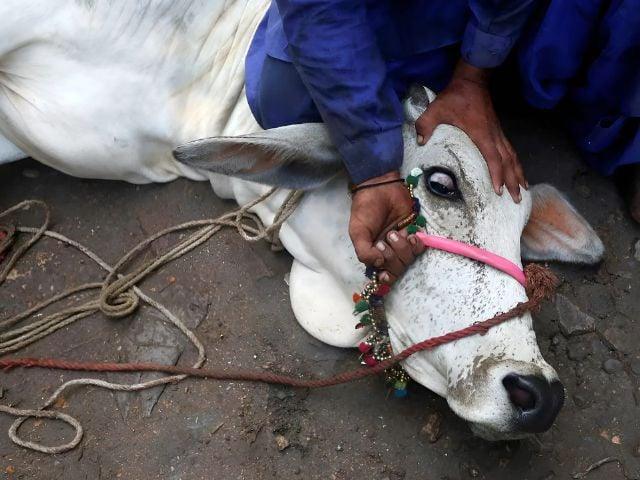Karachi:
Citizens of the city find it difficult to ensure that professional butchers carry out the Sunna of Hazrat Ibrahim (AS). Professional butchers have increased their prices by 30 to 50% this year.
Babu Qureshi, a professional liaquatabad butcher, explained that animal slaughter rates vary depending on the area and weight or size of the animal. He noted that professional butchers generally stop taking reservations three days before Eidul Azha.
This year, the minimum load for the slaughter of a large lighter animal on the first day of Eid varies from RS20,000 to 30,000 rupees and more. On the second day, the rate fell to approximately RS18,000, and on the third day, it still decreases to around 15,000 rupees. Heavy animal rates with excess weight are negotiated before slaughter.
Professional butchers have taken reservations for several animals in the neighborhood instead of simple animals. Last year, professional butchers billed 15,000 rupees at 25,000 or more rupees for the slaughter of a large animal. This year, prices for goats and sheep vary from Rs8,000 to 15,000. The second and third days, rates for small animals decrease from 30 to 50%.
Qureshi added that professional butchers have prioritized reservations in high -end districts where remuneration is generally higher. On the other hand, many medium and lower income areas are turning to seasonal butchers due to the limited availability of qualified professionals. Seasonal butchers – who work on a daily salary basis and do not take the butcher’s shop only during Eid. They offer their services to 30 to 50% lower rate than those of professional butchers.
These seasonal butchers often work in groups and are more requested in the middle class areas, where they get a better salary.
Rush for sharpening
We see people who buy new tools and clash the old ones for the preparation of meat after slaughter. As a result, stores sharpening knives and cuts are overloaded with a huge frequency of citizens.
In Al-Karam Square, Mohsin Ali, the owner of a shop that sells and sharpens such tools, said that a wide variety of knives, trades (Bugdah) and skewers were in great demand. The prices of new tools for the use of households have increased from RS100 to RS400. Different types of knives are sold for RS400 to RS2,500 or more, while the price of a bugdah varies from RS800 to RS3,000.
Most people choose to sharpen their old tools, with Display services costing RS150 to RS200 per tool. Some people buy tools up to Rs3,000 to prepare sacrificial meat.
Slaughter accessories fly shelves
Exponent quantities of mats and palm baskets have been sold for Eidul Azha sacrifice purposes, the sellers reporting fast sales in the days preceding the festival.
Amir Uddin, a seller selling carpets, baskets and wooden cutting blocks in Gharibabad, explained that the date palm mats are generally used to spread sacrificial meat, while the baskets are used to distribute it. This year, on Eid, carpets of different sizes were sold for RS500 to RO1,000, and baskets were sold for RS200 to RS400. Meanwhile, hatching blocks were sold to Rs100 per kilogram, the smallest selling for Rs500 to Rs800.
These items are made of wood and are essential for the distribution and storage of meat. People who execute the Sunnah of sacrifice buy these articles to facilitate the distribution of meat between family, friends and the needy. Temporary stands have been installed in various areas of the city to sell these products, offering temporary jobs and additional income for many people, including street vendors and craftsmen who create these traditional items.




